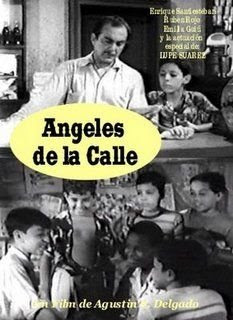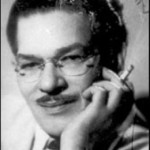“STREET ANGELS” A FELIX B. CAIGNET NOVEL.
The drama “Street Angels” was released on CMQ Radio, since 21 August 1948. The strong image of the history of Albertico Limonta and Cristina Isabel del Castillo, in “The Right to Be Born” clouded the value for posterity Angeles Street, despite the success in Cuba and then on to pioneer a subject of great human value.
It was an episodic series aimed at children and adolescents, primarily starring actors and actresses of that age; which meant for many of takeoff career in acting. Aware that then had to go for an unconventional project, he sat Caignet other Latin American premiere the brand new children’s theme in an unusual setting: the street.
The Los Angeles film the street, a Cuban-Mexican co-production premiered on January 25, 1954 in Havana Fausto film. The argument is based on the eponymous novel by Felix B. radial Caignet (who put some of the money for the filming).
Street Angels belongs to the creations of Caignet containing a complaint. In this case the social indifference to abandoned children. The film aged with a prehistoric distance (I imagine that even more radio scripts). False dialogues, adult children to express sermons rather than dialogue, scenes and incredible clumsy turns of the characters.
At the end the love and devotion of the poor to the rich can everything. -rubia Bad mother, young Bella is humanized son after the accident and its salvation with the blood of the buddy negro.Y the street children live in a kind of solidarity and virtuous community. Utopian. But I’m not attacking Felix B. Caignet, whose contribution to radio drama is enormous. From his vision and sensitivity, you may have done more than most of his colleagues (had the highest ratings) to touch human and social problems. What was Caignet shudder of hearts. He did it with great attention to the cry and to the best feelings of the people who were targeted those dramas.
The solution to his angels could not be in the novels or movies. You had to search deep transformations.
Josefa Bracero says researcher Oscar Luis Lopez when he died in 2007 gave the finishing touches to the book entitled ‘The radio and Felix B. Caignet’. And The Evergreen magazine published in its next installment Felix B. Caignet: place between afrocubanistas, Reynaldo González. Both texts could contribute to a definite appreciation of the author and birthright Angeles street.
Felix B. Caignet died in Havana on May 25, 1976.
Whenever I note the repercussion the work of this writer and composer I wonder if it is not time for a radial prize or a cultural institution in our country bear his name.
Wiki / Lazaro Sarmiento / InternetPhotos / Excerpts/ TheCubanHistory.com
The Cuban History, Hollywood.
Arnoldo Varona, Editor.
“ANGELES DE LA CALLE” LA NOVELA DE FÉLIX B. CAIGNET.
La radionovela “Angeles de la Calle” fue estrenada en CMQ Radio, desde el 21 de agosto de 1948. La fuerte imagen de la historia de Albertico Limonta e Isabel Cristina del Castillo, en “El derecho de nacer”, nubló el valor para la posteridad de Ángeles de la Calle, pese al éxito en la Cuba de entonces y a ser la pionera en un tema de gran valor humano.
Fue una serie episódica orientada a los niños y adolescentes, protagonizada principalmente por actores y actrices de esas edades; lo cual significó para muchos el despegue de la trayectoria artística en la actuación. Consciente que entonces tenía que apostar por un proyecto nada convencional, Caignet sentó otra primicia latinoamericana al estrenar la temática infantil en un escenario insólito: la calle.
La película Ángeles de la calle, una coproducción cubano-mexicana estrenada el 25 de enero de 1954 en el cine Fausto de La Habana. El argumento se basa en la novela radial homónima de Félix B. Caignet (quien puso una parte del dinero para la filmación).
Ángeles de la calle pertenece a las creaciones de Caignet que contienen una denuncia. En este caso la indiferencia social hacia la infancia abandonada. La película envejeció con una lejanía prehistórica (me imagino que los libretos radiales más aún). Diálogos falsos, niños-adultos que más que dialogar expresan sermones, escenas torpes y giros increíbles de los personajes.
Al final el amor y la devoción de los pobres hacia los ricos todo lo pueden. La madre mala -rubia, joven y bella- se humaniza después del accidente del hijo y de su salvación con la sangre del amiguito negro.Y los niños de la calle viven en una especie de comuna solidaria y virtuosa. Utópica. Pero no estoy atacando a Félix B. Caignet, cuyo aporte a la dramaturgia radial es enorme. Desde su visión y sensibilidad, puede que haya hecho más que la mayoría de sus colegas (tuvo los más altos ratings) para tocar problemas humanos y sociales. Lo de Caignet era estremecer los corazones. Lo hizo con los oídos puestos en el clamor y en los mejores sentimientos de las personas a las que iban dirigidos aquellos dramas.
La solución para sus ángeles no podía estar en las novelas ni en las películas. Había que buscarla en transformaciones de fondo.
Josefa Bracero asegura que el investigador Oscar Luis López al morir en 2007 daba los toques finales al libro titulado ‘La radionovela y Félix B. Caignet’. Y la revista La Siempreviva publicará en su próxima entrega Félix B. Caignet: su sitio entre los afrocubanistas, de Reynaldo González. Ambos textos podrían contribuir a una revalorización definitiva del autor de El derecho de nacer y Ángeles de la calle.
Félix B. Caignet falleció en La Habana el 25 de mayo de 1976.
Cada vez que constato la repercusión que tuvo la obra de este escritor y compositor me pregunto si ya no es hora de que un premio radial o una institución cultural de nuestro país lleven su nombre.
Wiki/Lazaro Sarmiento/InternetPhotos/Extractos/TheCubanHistory.com
The Cuban History, Hollywood.
Arnoldo Varona, Editor.







